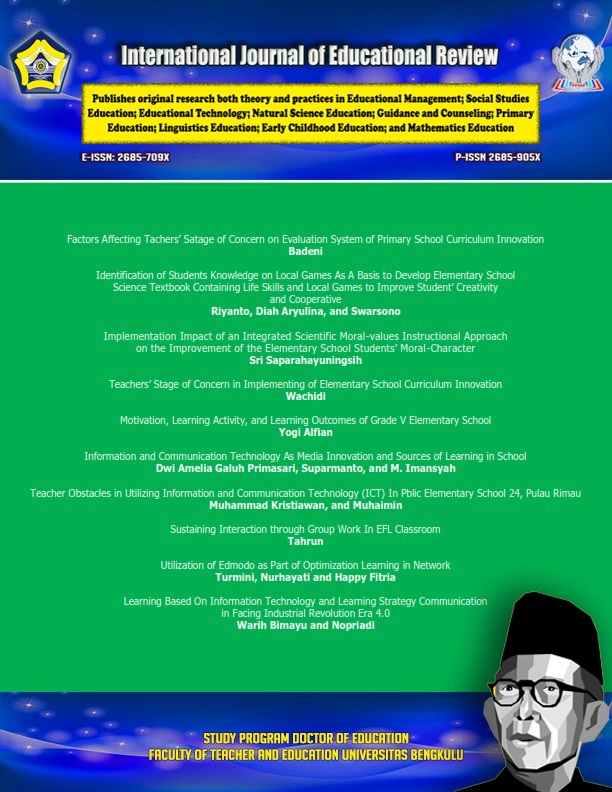Review of “Discourses of Globalisation, Cultural Diversity and Values Education” by Joseph Zajda
DOI:
https://doi.org/10.33369/ijer.v6i2.34297Abstract
This study aims to analyze the concepts in the book “Discourses of Globalisation, Cultural Diversity, and Values Education” by Joseph Zajda (2023). The method used in this study is a book review, in which the researcher summarizes each chapter of the book and identifies the primary approaches, namely Bronfenbrenner's Bioecological Model, Bandura's Social Learning Theory, Vygotsky's Language Development Theory, and James Banks' Multicultural Education Model. These approaches provide a theoretical basis for understanding multiculturalism's importance in guidance and counseling. The emphasis on (1) the positioning of education amid globalization and cultural diversity and (2) the formation of value education in schools based on how the school forms the value itself are the main implications of this finding. These implications reinforce the importance of value education in promoting cross-cultural understanding and enriching insights into the influence of the social environment to enhance the knowledge of how external factors shape individual development and identity. These findings provide practical guidance for counselors to be more responsive to the needs of clients from different cultural backgrounds. Education practitioners or counselors should position the education along with the diversity of the students with the basic principles of equality, democracy, and social justice, and be recommended to further explore the values education suitable to be implemented in the multiculturalism scheme of Indonesia.
References
Anghel, A., & Lupu, R. A. (2013). Multicultural Counseling in School. Procedia - Social and Behavioral Sciences, 92, 32–35. https://doi.org/10.1016/j.sbspro.2013.08.632
Black, C. M. (1988). A Handbook for Developing Multicultural Awareness. NASSP Bulletin, 72(511), 115–116. https://doi.org/10.1177/019263658807251131
Buchori Muslim, A. (2020). Character Education Curriculum in the Government of Indonesia Strengthening Character Education Program. JIEBAR : Journal of Islamic Education: Basic and Applied Research, 1(2), 137–153. https://doi.org/10.33853/jiebar.v1i1.101
Chan, A. W., Yeh, C. J., & Krumboltz, J. D. (2015). Mentoring ethnic minority counseling and clinical psychology students: A multicultural, ecological, and relational model. Journal of Counseling Psychology, 62(4), 592–607. https://doi.org/10.1037/cou0000079
Cooper, H. M. (1988). The structure of knowledge synthesis. Knowledge in Society, 1(1), 104–126.
Fink, A. (2019). Conducting research literature reviews: From the internet to paper. Sage publications.
Gajić, M., Vujadinović, S., & Popović, S. (2017). Globalization and Cultural Identity. HERALD, 8(20). https://doi.org/10.7251/HER2016041G
Haris, H., Haryanto, B., & Oktafia, R. (2020). Management and Role of Guidance and Counseling in Educational Institutions for Personal Development of Students. Proceedings of The ICECRS, 6. https://doi.org/10.21070/icecrs2020388
Hayati, M. L., Supriyanto, A., Wibowo, M. E., Mugiharso, H., Suprihatin, B., & Hendiani, N. (2022). Multicultural Guidance Design. European Journal of Education Studies, 9(4). https://doi.org/10.46827/ejes.v9i4.4224
Kholifah, N., Sylvia, N., & Ahman, A. (2024). Understanding School Climate: The Influence of Peer Social Interactions on Student Resilience. KONSELI: Jurnal Bimbingan Dan Konseling, 11(2), 153–160.
Lue, M. M., & Riyanto, K. B. (2020). Multicultural Social Peaceful Education through Social Guidance and Counseling Services in Development of Industrial Revolution 4.0. Proceedings of the 2nd International Seminar on Guidance and Counseling 2019 (ISGC 2019). https://doi.org/10.2991/assehr.k.200814.052
OECD. (2019a). OECD Future of Education and Skills 2030.
OECD. (2019b). OECD Learning Compass 2030: A Series of Concept Notes.
OECD. (2019c). Well-being 2030 Action OECD FUTURE OF EDUCATION AND SKILLS 2030 A SERIES OF CONCEPT NOTES.
Rogers, J. L., Gilbride, D. D., & Dew, B. J. (2018). Utilizing an Ecological Framework to Enhance Counselors’ Understanding of the U.S. Opioid Epidemic. The Professional Counselor, 8(3), 226–239. https://doi.org/10.15241/jlr.8.3.226
Salman, I., Albana, H., Izzy, N. Q., Sylvia, N., & Hadiana, D. (2022). Measuring The Character Integrity of Priangan Students: Case Study in Garut. Fikrah: Journal of Islamic Education, 6(2), 167–176.
Swanson, J. L. (1993). Integrating a Multicultural Perspective Into Training for Career Counseling: Programmatic and Individual Interventions. The Career Development Quarterly, 42(1), 41–49. https://doi.org/10.1002/j.2161-0045.1993.tb00243.x
Sylvia, N. (2015). Correlation Between School Social Climate and Students’ Achievement in English Subject. Universitas Bengkulu.
Sylvia, N. (2022, September). Student Diversity in Educational Psychology: Book Chapter Review. BRIN EduResearch Newsletter.
Yusuf, S., & Nurihsan, A. J. (2016). Landasan Bimbingan dan Konseling. PT Remaja Rosdakarya.
Zajda, J. (2023). Discourses of Globalisation, Cultural Diversity and Values Education (Vol. 34). Springer Nature Switzerland. https://doi.org/10.1007/978-3-031-22852-0
Zein, S. (2020). Language Policy in Superdiverse Indonesia. Routledge. https://doi.org/10.4324/9780429019739
Downloads
Published
How to Cite
Issue
Section
License

This work is licensed under a Creative Commons Attribution-ShareAlike 4.0 International License.




